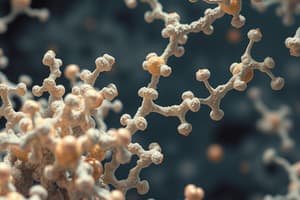Podcast
Questions and Answers
What are some functions of proteins within organisms?
What are some functions of proteins within organisms?
Proteins perform functions such as catalyzing metabolic reactions, DNA replication, responding to stimuli, providing structure to cells and organisms, and transporting molecules from one location to another.
What primarily differentiates proteins from each other?
What primarily differentiates proteins from each other?
Proteins primarily differ from one another in their sequence of amino acids, which is dictated by the nucleotide sequence of their genes.
What are proteins?
What are proteins?
Proteins are large biomolecules and macromolecules that comprise one or more long chains of amino acid residues.
What are short polypeptides commonly called?
What are short polypeptides commonly called?
What is a polypeptide?
What is a polypeptide?
Flashcards are hidden until you start studying
Study Notes
Proteins and Polypeptides
- Proteins perform a wide range of functions within organisms, including catalyzing metabolic reactions, replicating DNA, responding to stimuli, transporting molecules from one location to another, and storing energy.
Protein Differentiation
- The sequence of amino acids in a protein's polypeptide chain primarily differentiates proteins from each other, giving each protein its unique 3D structure and function.
Proteins Defined
- Proteins are large, complex biomolecules that are composed of one or more chains of amino acids, referred to as polypeptides.
- Proteins play crucial roles in nearly all cellular processes and are necessary for the structure, function, and regulation of cells, tissues, and organs.
Polypeptides and Peptides
- A polypeptide is a chain of amino acids linked together by peptide bonds.
- Short polypeptides, typically consisting of fewer than 30-50 amino acids, are commonly referred to as peptides.
Studying That Suits You
Use AI to generate personalized quizzes and flashcards to suit your learning preferences.




